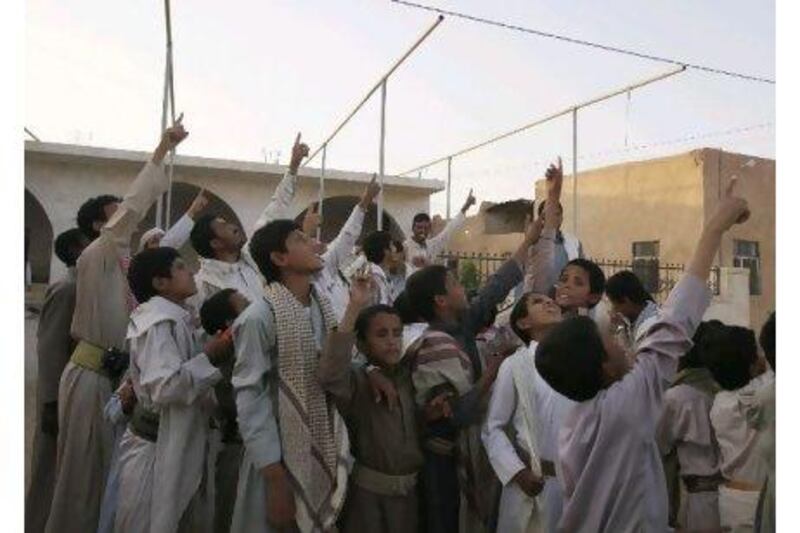WASHINGTON // Preparing for a worst-case scenario in Yemen, the United States is building a secret CIA air base in the Arabian Gulf region to target al Qa’eda terrorists there, in case anti-American factions win the current power struggle and shut US forces out.
The White House has already increased the numbers of CIA officers in Yemen, in anticipation of that possibility. It has also stepped up the schedule to construct the base, from a two-year timetable to a rushed eight months.
The Associated Press has withheld the exact location of the base at the request of US officials. They spoke on condition of anonymity because portions of the military and CIA missions in Yemen are classified.
The current campaign is run by a military counterterrorism unit, the Joint Special Operations Command (JSOC), with the CIA providing intelligence support. JSOC forces have been allowed by the Yemeni government of Ali Abdullah Saleh to conduct limited strikes there since 2009. Mr Saleh loyalists have recently allowed expanded strikes by US armed drones and even war planes against al Qa'eda targets who are taking advantage of civil unrest to grab power and territory in the country.
The CIA director, Leon Panetta, said last week that agency officers were working in Yemen together with JSOC, as well as other areas where al Qa'eda is active.
But the CIA would not confirm the White House decision to build the CIA base or expand the agency's operations in Yemen.
The new base suggests a long-term US commitment to fighting al Qa'eda in the region, along the lines of the model used in Pakistan, where CIA drones hunt militants with tacit, though not public, Pakistani government approval.
Yemeni officials have indicated their preference toward drones, versus allowing US counterterror strike teams on Yemeni soil, saying they are less apt to incense the local population. But the new base would enable continued operations without Yemeni approval.
If the Yemenis halt cooperation with US counterterrorist forces that would also probably mean a shift to putting the CIA in charge of the al Qa'eda hunting mission in Yemen, senior US officials said.
While that policy debate plays out in Washington, US special operations forces based just outside Yemen are taking aim almost daily at a greater array of targets that have been flushed into view by the unrest. US forces have stepped up their targeting as well, because of the besieged Yemeni government's new willingness to allow US forces to use all tools available, from armed drones to war planes, against al Qa'eda as a way to stay in power, the US officials said.
The US needs to keep the pressure on, to break al Qa'eda's momentum there, the State Department's counterterror coordinator, Daniel Benjamin, said on Tuesday. There are growing concerns that AQAP will use the chaos to acquire more weapons, and also to fuel connections between al Qa'eda-linked militants there and al Shabab insurgents in Somalia, he added.
The Obama administration has been working for months in concert with the mediation efforts of Yemen's Gulf neighbours to persuade Mr Saleh to transfer power. Mr Saleh was evacuated for emergency medical treatment in Saudi Arabia, after being hit by explosive devices.
The US has continued to press for a deal in the hope that a political solution could pre-empt any plan by the Yemeni leader to return. That, officials fear, could lead to further instability.
Mr Benjamin said he is hopeful that counterterrorism efforts will continue in Yemen, as the political transition moves along and a new government takes hold.
Since 2009, Yemen has allowed JSOC to employ a mixture of armed and unarmed drones, ship-fired missiles, small special operations teams working with Yemenis, and occasional war plane bombing runs, Yemeni and US officials say. But permission was on a case-by-case basis, and waxed and waned depending on the mood of the mercurial Yemeni president.





